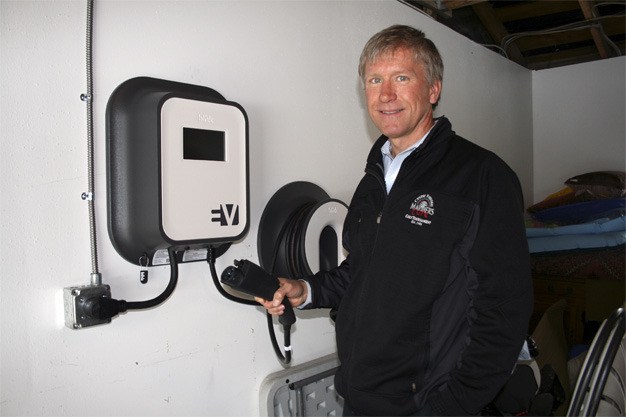Besides saving the planet, the attractiveness of electric vehicles has been the idea that you could simply plug it in. But as many drivers have found, powering up your car via the outlet in your garage takes a bit of planning ahead — recharging can take several hours. Now, however, there is at least one alternative way to power up your car more quickly: installing a 240-volt power unit in your home.
Scott and Mary Jenkins are the first Mercer Island residents to have an electric vehicle charging station installed in their home. Evergreen Power Systems of Seattle did the installation. The Jenkins, however, had their installation paid for, as data will be collected from their unit for use in a study.
Evergreen Power Systems is one of four contractors in King County participating in the EV Project, part of a $99.8 million grant from the U.S. Department of Energy, as part of the American Recovery and Reinvestment Act. The grant paid for installation of the charging station. The Jenkins applied to participate in the EV project when they ordered their Nissan LEAF over a year ago. The couple just took delivery of the third Nissan LEAF in the state.
Scott Jenkins said his charger is hooked up to a wireless data link with the EV project so they can study use and demand for electricity from his garage for two years. The charging station is 240 volts, using a 40-amp breaker.
“This one was fairly easy to install because the main electrical panel was in the garage,” said Quinn Mackey, with Evergreen Power Systems. “It took about three hours.”
The primary benefit of a home charging station is faster charging, of course. Using the 240-volt home charging station, charging time is cut in half from using a 120-volt home plug-in.
Another benefit is lower cost electricity rates if you charge your car during off-peak electrical use times. There is also a possibility of incentive programs coming soon and tax benefits for installing a charging unit.
Jenkins said the cost of a Nissan LEAF is about $32,500, and he will be able to apply for a $7,500 federal tax credit when he files his tax return for 2011. Purchasing an electric car also exempts a buyer from the state sales tax at present.
Jenkins said as he considered an electric car, he has been interested in the Nissan LEAF from the very beginning.
“It’s the first electric car by a major manufacturer,” he said of the car.
Jenkins said when fully charged, the range of the Nissan LEAF is about 100 miles. And, contrary to what one might think, the car is not a glorified golf cart — Jenkins said it’s just like any other car inside.
The 2011 Nissan LEAF, available in Seattle at Stadium Nissan, was also rated best-in-class for the environment. Jenkins is proud of that fact. He traded in his Toyota Prius, a hybrid, which gets 42 to 45 miles per gallon. He said that works out to about 6 cents per mile in his Prius, as compared to the LEAF, costing an estimated 3 cents a mile in energy.
“Economically and environmentally, it makes a huge difference,” Jenkins said.
Any licensed electrician can install a home charging station. A permit from the City of Mercer Island must be obtained to install a home charging station. Linda Pineau, the permit center supervisor for the city, said in this case the contractor, Evergreen, applied for the permit online at mybuildingpermit.com and had the permit overnight. The fee is $127.
It is quick and easy, she said.
“Over-the-counter permitting is also an option,” Pineau said. “If there was no one in line in front of them, they could be out the door in 10 minutes.”



